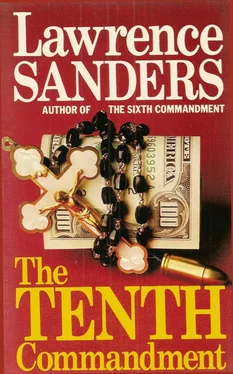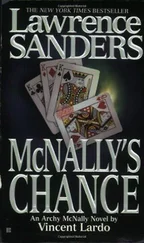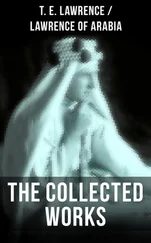Lawrence Sanders - Tenth Commandment
Здесь есть возможность читать онлайн «Lawrence Sanders - Tenth Commandment» весь текст электронной книги совершенно бесплатно (целиком полную версию без сокращений). В некоторых случаях можно слушать аудио, скачать через торрент в формате fb2 и присутствует краткое содержание. Жанр: Криминальный детектив, на английском языке. Описание произведения, (предисловие) а так же отзывы посетителей доступны на портале библиотеки ЛибКат.
- Название:Tenth Commandment
- Автор:
- Жанр:
- Год:неизвестен
- ISBN:нет данных
- Рейтинг книги:4 / 5. Голосов: 1
-
Избранное:Добавить в избранное
- Отзывы:
-
Ваша оценка:
- 80
- 1
- 2
- 3
- 4
- 5
Tenth Commandment: краткое содержание, описание и аннотация
Предлагаем к чтению аннотацию, описание, краткое содержание или предисловие (зависит от того, что написал сам автор книги «Tenth Commandment»). Если вы не нашли необходимую информацию о книге — напишите в комментариях, мы постараемся отыскать её.
Tenth Commandment — читать онлайн бесплатно полную книгу (весь текст) целиком
Ниже представлен текст книги, разбитый по страницам. Система сохранения места последней прочитанной страницы, позволяет с удобством читать онлайн бесплатно книгу «Tenth Commandment», без необходимости каждый раз заново искать на чём Вы остановились. Поставьте закладку, и сможете в любой момент перейти на страницу, на которой закончили чтение.
Интервал:
Закладка:
'And during those ten years, sir? Can his dependants draw on his assets?'
'A temporary administrator, appointed by the court, preserves the assets of the estate, pays the required taxes, supports the missing person's family, and so forth. But
once again, a diligent search must be made to locate the missing person.'
'Now I am confused, sir,' I said. 'Apparently, under the first law you mentioned, a missing person can be declared dead after five years. Under the second law, it requires ten years before the estate can be divided amongst his heirs.'
'A nice point,' Mr Teitelbaum said. 'And one that has occasioned some heated debate amongst our younger attorneys and clerks to whom I assigned the problem. My personal opinion is that the two statutes are not necessarily contradictory. For instance, in the second case, under the Surrogate's Court Procedure Act, during the ten-year administration of the estate, the administrator or any interested person may petition for probate of the will by presenting sufficient proof of death. I would judge,' he added dryly, 'that the finding of the body would constitute sufficient proof.'
'Uh, well, sir,' I said, trying to digest all this, 'what is going to happen to the Stonehouse family, exactly?'
'I would say,' he intoned in his most judicial tones,
'after reviewing the options available, that they would be wise to file for relief under the SCPA and accept in good spirit the appointment of a temporary administrator of Professor Stonehouse's estate. That is the course I intend to urge upon Mrs Stonehouse. However, in all honesty, Mr Bigg, I must confess that I have not been moving expeditiously in this matter. Mrs Stonehouse and the children, while hardly individually wealthy, have sufficient assets of their own to carry them awhile without fear of serious privation. Their apartment, for instance, is a co-operative, fully paid for, with a relatively modest maintenance charge. I have, in a sense, been dragging my feet on an application for appointment of a temporary administrator until we can prove to the court that a diligent search for Professor Stonehouse has indeed been made. Also, I am quite disturbed by what you have told me of the attempted 247
poisoning. I would like to see that matter cleared up before a court application is made. I would not care to see an allowance paid to a family member who might have been, ah, criminally involved in the Professor's disappearance.'
'No, sir,' I said. 'I wouldn't either. Another point: supposing that an administrator is appointed for a period of ten years and nothing is heard from Professor Stonehouse during that time. Then his will goes to probate?'
'That is correct.'
'And if no will can be found?'
'Then the division of his estate would be governed by the laws of intestacy.'
'Could he disinherit his wife? If he left a will, I mean?'
'Doubtful. Disinheriting one's spouse is not considered in the public interest. However, he might disinherit his wife with a clear reason provable in a court of law.'
'Like trying to poison him?'
'That might be sufficient reason for disinheritance,' he acknowledged cautiously. 'Providing incontrovertible proof was furnished.'
'The same holds true for his son and daughter, I presume?'
Mr Ignatz Teitelbaum took a deep breath.
'Mr Bigg,' he said, 'the laws of inheritance are not inviolable. Even an expertly drawn will is not a sacred document. Anyone can sue, and usually does. Ask any attorney. These matters are usually settled by compromise, give-and-take. Litigation frequently results. When it does, out-of-court settlements are common,'
'May I pose a hypothetical question, sir?'
'You may,' he said magisterially.
'Suppose a spouse or child attempts to inflict grievous bodily harm upon the head of the family. The head of the family has proof of the attempt and disinherits the spouse or child in a holographic will that includes proof of the attempt upon his life. The head of the family disappears.
But the will is never found. At the end of ten years, or earlier if the body is discovered, the estate is then divided under the laws of intestacy. The guilty person would then inherit his or her share?'
'Of course,' he said promptly. 'If the will was never found, and proof of the wrongdoing was never found.'
'If the body was discovered tomorrow, sir, how long would it take to probate the will?'
'Perhaps a year,' he said. 'Perhaps longer if no will existed.'
Then he was silent. He unlatched his fingers, spread his brown hands out on the desktop. His head was lowered, but his bright eyes looked up at me sharply.
'You think the body will be discovered tomorrow, Mr Bigg?' he asked.
'I think it will be discovered soon, sir,' I said. 'I don't believe whoever did this has the patience to wait ten years.'
'You're assuming a second will was drawn,' he said.
'Perhaps the head of the family never got around to it.
Perhaps his original will is in existence and still valid.'
I hadn't considered that possibility. It stunned me. But after pondering it a moment, it seemed unlikely to me.
After getting the results of those chemical analyses, Professor Yale Stonehouse would surely write a new will or amend the original. It was in character for him to do that.
He was an ill-natured, vindictive man; he would not take lightly an attempt to poison him.
'One final request, Mr Teitelbaum,' I said. 'I am convinced that when Professor Stonehouse left his home on the night of January 10th, he went somewhere by cab or in a car that was waiting for him. It was a raw, sleety night; I don't think he'd wait for a bus or walk over to the subway. I can't do anything about a car waiting for him, but I can attempt to locate the cab he might have taken. All taxi drivers are required to keep trip sheets, but it would be an enormous task checking all the trip sheets for that
night, even if the taxi fleet owners allowed me to, which they probably wouldn't. What I'd like to do is have posters printed up, bearing the photograph of Professor Stonehouse and offering a modest reward for any cabdriver who remembers picking him up at or near his home on the night of January 10th. I admit it's a very long shot. The posters could only go in the garages of fleet owners, and there are many independent cabowners who'd never see them. Still, there is a chance we might come up with a driver who remembers taking the Professor somewhere on that particular night.'
'Do it,' he said immediately. 'I approve. It will be part of that "diligent search" the law requires.'
He started to say more, then stopped. He brought two wrinkled forefingers to his thin lips and pressed them, thinking.
'Mr Bigg,' he said finally, 'I think you have conducted this investigation in a professional manner, and I wish to compliment you.'
'Thank you, sir.'
'However,' he said sonorously, 'it cannot be openended.
The responsibility of this office is, of course, first and foremost to our clients. In this case we are representing the missing Professor Stonehouse and his family. I cannot hold off indefinitely the filing of an application for the appointment of a temporary administrator of the Professor's estate. It would not be fair to the family. Can you estimate how much more time you will require to complete your investigation?'
'No, sir,' I said miserably. 'I can't even guarantee that I will ever complete it.'
He nodded regretfully.
'I understand,' he said. 'But I cannot shirk our basic responsibility. Another week, Mr Bigg. I'm afraid that's all I can allow you. Then I must ask you to drop your inquiries into this, uh, puzzling and rather distasteful affair.'
I wanted to argue. I wanted to tell him to go ahead with his legal procedures, but to let me continue digging. But in all honesty I didn't know what more I could do in the Stonehouse case after I placed those reward posters in taxi garages. Where did I go from there? I didn't know.
Читать дальшеИнтервал:
Закладка:
Похожие книги на «Tenth Commandment»
Представляем Вашему вниманию похожие книги на «Tenth Commandment» списком для выбора. Мы отобрали схожую по названию и смыслу литературу в надежде предоставить читателям больше вариантов отыскать новые, интересные, ещё непрочитанные произведения.
Обсуждение, отзывы о книге «Tenth Commandment» и просто собственные мнения читателей. Оставьте ваши комментарии, напишите, что Вы думаете о произведении, его смысле или главных героях. Укажите что конкретно понравилось, а что нет, и почему Вы так считаете.












